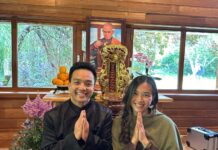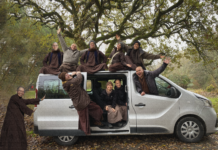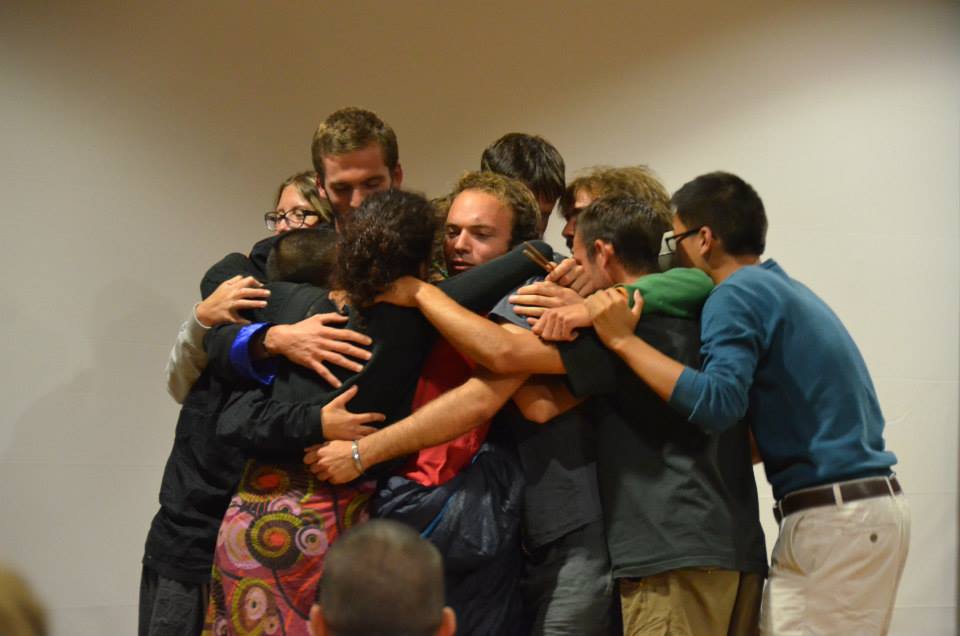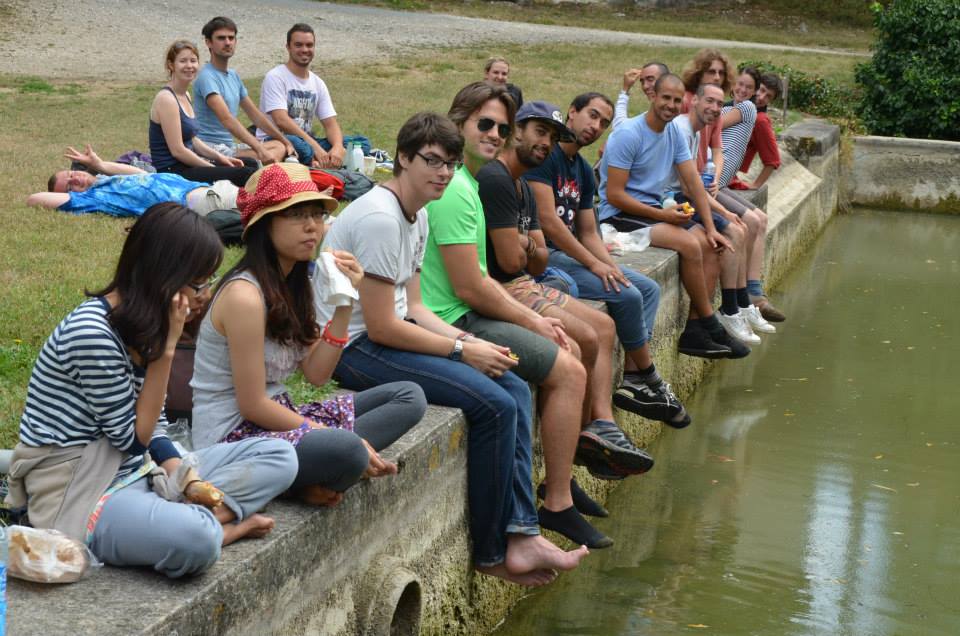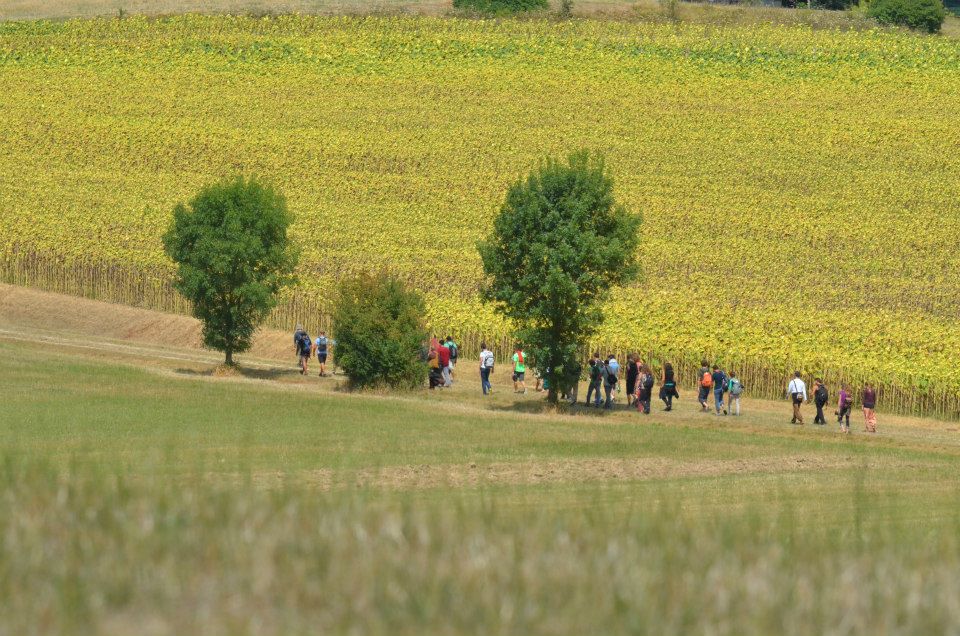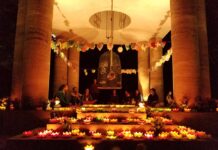During the International Wake Up Retreat in Plum Village in August 2013 – PART II
BBT: If somebody asks you how to build a sangha, what tips/advice/things would you share with them?
Annika: Maybe one thing is to keep things simple. Not wanting to do too much too soon. I remember when we talked about starting Wake Up in Ireland, Wake Up Dublin. The most recent example we have is Wake Up Belfast and Wake Up London.
Wake Up London is most known to us for organising those huge meditation flashmobs with hundreds of people coming together in a public place in London. And that looked very impressive.
Personally, I find that a bit daunting. I thought it’s a bit like organising a rock concert every week you know. How do you do this? And do I really want to do this and am I stable enough in my practice not to get distracted by exterior form? And come home and be with it?
And I think one of the most touching things and helpful things that Brother Stream (Brother Phap Luu) said when he talked to us about starting a Wake Up group is just do whatever you want, but just make sure to have fun together.
And I thought putting myself through this monstrous stress of organising that every week doesn’t sound like fun to me. And we actually started very, very small. We met in people’s living rooms. The smallest sangha we had was 4 people and it was a very lovely, intimate evening. And I am so grateful to have had that sangha. I
It wasn’t a rosy sangha then when a lot of people showed up and we also made sure to spend time together. Sometimes we met for a meal where everybody cooked something where we shared and we eat mindfully. Sometimes we go out to a concert and it’s so important to enjoy the company and maybe find one simple practice that you share.
For example, you don’t want to make it too complicated. Meet with two friends in a park, take a walk mindfully, or meet people once a week to share a meal mindfully. Just take your favorite practice. The practice that nourishes you that you enjoy. Just do that and do that constantly.
Then if you generate joy and mindfulness for yourself, I think other people will be naturally attracted to that and you don’t have to waste your energy in trying to convince them that what you are doing is greatest things that you like to spread. So I think simplicity and enjoyment are two most important things for me.
Brian: I think my advice would be quite similar. Three things maybe. First thing is just start, don’t wait for ten people together. Just one, if you know one person who meditates, that’s enough. Just do it together and both of you will get benefit of this.
Second thing is don’t think too much about structure. If you are hosting it in your home, don’t think about, “Oh we should start with this, with that, we need tea, we need pillows.” Just invite people and let it flow. I think in Hamond Siddhartha, there’s a nice picture if you are searching for something, if you have ideas in your head and you only have the things which you are searching for before your eyes, and you are blind for everything else that’s coming up.
There are so many beautiful things that can arise if you just open and don’t wait for something. And third thing connected to joy is you have to start to sing because I don’t know maybe is neuroscientist things. But singing connects from the first moment on. Thank you.
Katharina: I can also support what has been said. One thing I try to keep a structure or give orientation about is the sharing. Because sometimes, it has happened that people started talking about each other.
I feel that without a formal space for sharing it’s a very different level of talking, which is also okay. But for the sharing, I really like to introduce the basic idea of a sharing to people who come for the first time.
Also I feel too much freedom is not helpful for the sharing. I support what Annika and Brian said.
Leni: I don’t have anything to add.
Katharina: I have one small thing to add. We don’t advertise our sangha very much. I know many people have different opinions about Facebook and I have mixed feelings about Facebook. But it’s a very simple and cheap possibility to share information.
We have a Wake Up Berlin Facebook page. Many people find us through there and try to come to our sangha. So this is a very simple way to announce and make things public.
BBT: Dear friends, how often do you meet? And what is your schedule?
Katharina: In Berlin, we meet every 2 weeks for 2 – 2.5 hours. We don’t have a fixed schedule, but we do silent sitting. If new people come, we start with guided sitting meditation because it’s a little bit easier to get used to the sitting.
Otherwise, we do silent sitting and sharing. These two things are always there and then we decide together as a sangha what we’d like to do. Sometimes people are very tired, so we do deep relaxation. If the weather is nice, we do walking meditation outside. We read excerpts from Thay’s books, watch a Dharma talk, or sing some songs. So it’s a mixture of practice.
Leni: In Belgium we come together for a whole day. Once or twice per month, usually once a month. Because we all live far away from each other, we don’t live in one town. We gather from all over the place and we have to travel to get there. So that’s why we choose to do it on the weekend.
We start at around 10 am till 5 or 6pm with an optional dinner together in the evening. There’s no fixed schedule, but we usually have sitting meditation and mindful tea meditation. Because it’s a whole day, we also have lunch together. We usually read the Five Contemplations and eat a little bit in silence together, and it’s always nice.
We also ask people to bring something to eat and share. In the afternoon, we usually go for a walk, or we sing, make music together sometimes. We just spend some time together and end the day with sharing, my favorite part of the day.
Sometimes I invite people to come to my place, where I live in the evening to be together or to practice together for like two hours, but I don’t call it Wake Up. I invite friends whom I know are interested, but it’s not on Facebook, or we invite everyone in Belgium to come because It’s just very random and very impulsive also for the next day or the day after that. I enjoy those gatherings as well.
Annika: In Dublin, I think we are probably closest to the traditional sangha structure. We meet once a week for 2 hours, and it’s either Friday evening or Sunday eve to make sure if people who always have something on that day can at least catch one of the two.
We started our meetings at people’s homes, but then we were fortunate enough be able to move to the Oscailt Centre. That means that we are of the beliefs for once that for people who are facilitating that it’s easier to facilitate if you don’t have to invite a lot of people you may or may not know to your own home.
Some people may not be willing to do that. So it helps the facilitator, but we also feel that maybe if new people come they will feel less shy about going to a meditation group that they are not coming to a strange person’s house but coming to a center, that is a more neutral ground for them.
And a typical evening would be 20 minutes of guided meditation to help us calm down and arrive, 10 minutes of walking meditation, 15-20 minutes of silent sitting. We normally have a Dharma talk, so it can be a great video that you found of Thay’s talking or we read together from a book and pass it around.
It’s always lovely to hear all the different accents we have because we are a very mixed group from all over the world. Occasionally, people also bring in any books, for example from Pema Chodron or a neighboring tradition. We try to keep it centered on Thay’s tradition, but we also want to bring in any thing related that we think would nourish us as a group.
We always have a Dharma group-sharing. And that is something most of us enjoy. When people come in for the first time, most of them embrace it. They are happy to share and usually share very personal things. Sometimes we do deep relaxation, we regularly read the 5 Mindfulness Trainings together and that usually bring up a lot of discussion. People relate to them, exploring and share them.
We also practice flower watering as the first step to beginning anew because we got the advice from an older brother, who’s like a grown-up friend, that it is good as a community to start practising that before we have any conflicts. And also to pay a lot of attention to learn well how to water each other’s flowers and how to build that trust. To become really good at flower watering part, and not just start practising that when things are difficult for you as a group.
And we’ve had really touching and beautiful evenings. I think people were surprise to hear their friends share about them and you could see how their flowers are growing, how the good stuff mentioned getting stronger by that. That is a very good practice as well.
Sometimes we have a day of mindfulness, when we meet at someone’s house, practice for several hours and share a meal together. So far we have organised residential retreats for people from all over Ireland.
BBT: If you can, please share a bit about your difficulties during your journey of sangha building, and how you overcame them. Is there any support that we could provide to you as monastics? I know it’s not easy for us to be in different places at the same time, but at least we can share with you ideas and support by providing information.
Katharina: I’m very fortunate that we have the “Source of Compassion” sangha and three supporting Dharma teachers in Berlin. I feel that we are very much supported by the sangha there and the Dharma teachers. So I already feel a lot of support, which maybe we don’t use it much as we could. That is one thing I take with me from this retreat: to connect to the local sangha a little bit more.
For example, they gave us cushions because it’s too expensive to buy. What would be very nice is to have retreats like friends in Ireland. There have been Wake Up retreats in Germany, but Germany is a big country so it’d be nice to have it in different places. It would be nice to have monastic to be part of retreats because I think for people who are new to the practice, it’s a good way to look a little deeper into the practice. We know that you already have a lot of things to do and you travel a lot, but that’d be nice.
Leni: In the years that we’ve had Wake Up Belgium, we have had many difficulties, like some core members stopping to come. We can’t find consensus on what we want to do together, what is a good way to do it and sometimes we have big differences in opinions. And because we live far away from each other, maybe we don’t take a lot of time to talk about it, so it feels like we are still searching for a way to organise the sangha and the gathering in a way that feels good for everyone.
Personally, what I find really difficult is that I’m very insecure and I put a lot of pressure on myself as I said earlier. I don’t know if I have anything to offer to anyone, or what I am doing is right, or does it come from the heart or not. Confusion and doubt. It’s difficult because it also blocks the joy and the energy a lot. But I talked about this with someone from the adult sangha. She said that she also encountered this problem and it’s also part of the practice. I almost wanted to quit, but I know it’s just part of the practice.
Brian: Thank you very much for this very inspiring round. I think I can take a lot of ideas to my sangha now. I hope you also find your inspiration.
Annika: For us there was a big difficulty also, as I mentioned it previously, that after nine months we had our first crisis.
Two members of the sangha were calling people names and using the Dharma group-sharing to talk about how they dislike members of other religions, saying things like loving speech is totally stupid because if someone chooses to be insulted of something, at something I say, that’s totally their responsibility.
While most of us feel that the basis, the foundation of our group, or our relationship with each other is an agreement to at least try to support each other, nourish and be kind. They seemed to be of the opinion that the social experiment is that you can do whatever you want in the group, and whatever you want to members of the group, and they have to accept it.
If not, they are not good Buddhists. And I didn’t agree with that, I think love and loving kindness does not exclude having boundaries, and also does not mean that when you feel the behaviour of others bring up suffering for you, then you have to enable them to continue.
I think that’s not healthy for me and not healthy for them. And people started to stay away, because they didn’t enjoy the sangha and I also notice how important it is to have a safe space. I didn’t feel safe anymore and I also could feel a lot suffering coming up for me because the sangha is such a precious thing for me as a group, a space, an opportunity.
I also could see how it could help other people with their suffering. Some people had a loss of member of their family and in grievance. And I found the last thing they needed is to come to a place where they wanted to feel safe and be supported, but then they were being called names or always felt kind of scared about what was coming up next.
That was definitely as difficult time. For a while we just sat, watching our own reaction to that and didn’t react. But I got to the point where I could see from randomly spoke to people I know, that at least seven people started to stay away from the group, temporarily or permanently because of that behaviour.
And it was very helpful that we reached out to our grown up local sangha Denis O’Brady, who helped to set up our sangha and who has been practising for 20 years. He has been like a godfather to us and we also had advice from the monastic brothers who have been very involved with Wake Up from PV.
It’s very important to get this advice and support. Things got worse in a way that they were also posting things on our Facebook page. They were writing on the wall of our Facebook page, fantasizing about drugging people against several people of the sangha and killing members of the sangha at the next retreat.
It seemed to me that they were communicating with the intention to provoke, and we ended up blocking them from writing more messages on the Facebook page. They decided that they were insulted by this and didn’t come to the group anymore.
It’s very difficult for us to make decision as a group because I feel very strongly that I want to protect the group, but I don’t feel that I get to make the decision on behalf of the group on my own. It’s very important for us to come together as a core group to talk about this.
I am still a bit sad because that behaviour stems from suffering. I am not able to find the way to embrace the suffering and hold it that much that those individuals could transform within the group, but I have to say that I feel relieved and glad that that behaviour now is gone from the group.
Yes, it was a very difficult situation. I still have many questions, like how could we have done it better, but at the same time, I’m glad that the sangha didn’t end there. We are still around.
It’s important to know that I have support of the sangha and I am not on my own. And this is one of the things that I need to ask for help and accept help because it’s easy to feel let down if you don’t get support in difficult situation like that. So yes, I notice how important it is to have older brothers and sisters and also the ability to reach out to PV when something like that comes up.
BBT: I feel so much for you because sometimes in PV we come through difficult decision like that, too. Sometimes, there are lay friends who come here to practice, and they have certain behaviours that disturb the sangha.
They live with other lay friends. People come here to take refuge in the sangha, so we have the duty of care towards people, for their well-being while they are here. So sometimes we have to make a very difficult decision to ask people to leave.
When they want to come back, we have to say No and it’s very difficult for us.
But we have to do it because we have the responsibility to look after a greater group of people. If we try to embrace it, other lay friends will have to pay too much cost because they come with sometimes so much suffering and they need somewhere to transform their suffering.
They don’t need to get extra things, so we have to make a very difficult decision. I really appreciate what you share. I think you have done very well. You have been very brave with such clarity. Thank you for being there.
I am very happy to listen to a variety of experiences from different groups with different needs. I think it’s wonderful to have different models so that people can learn from and be inspired. Thank you.



